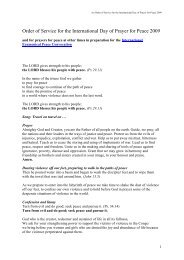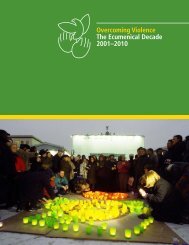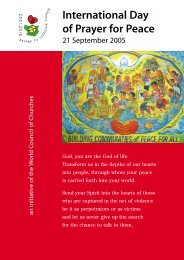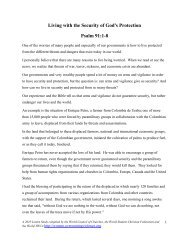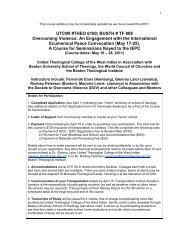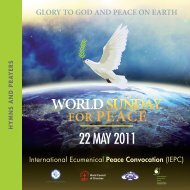Alternative Globalization Addressing Peoples and Earth
Alternative Globalization Addressing Peoples and Earth
Alternative Globalization Addressing Peoples and Earth
Create successful ePaper yourself
Turn your PDF publications into a flip-book with our unique Google optimized e-Paper software.
12<br />
agreements. Failure to comply with these policies, <strong>and</strong> the failure of<br />
these policies, once implemented, to produce their promised benefits,<br />
are blamed on “bad governance” rather than on the neoliberal model<br />
itself. Yet the most fundamental underst<strong>and</strong>ing of democracy, justice<br />
<strong>and</strong> self-determination underlines that the only way to secure genuine<br />
good governance is through the regulation of capital <strong>and</strong> markets to<br />
serve the needs of the people, as defined by the people themselves;<br />
• that free markets, free trade, self-regulation <strong>and</strong> competition will<br />
liberate the “invisible h<strong>and</strong>” of the market for the benefit of everyone.<br />
Yet there is no divine force that guides markets. To suggest that markets<br />
have such saving powers amounts to idolatry. In any case, “free” markets<br />
are not free. The myth of “unfettered”, “unregulated”, “uncontrolled”<br />
market capitalism must be directly challenged. The reality is that<br />
markets <strong>and</strong> capital are highly controlled to secure the maximum<br />
benefits for the owners of capital. Liberalization “frees” capital <strong>and</strong><br />
markets from social obligation, <strong>and</strong> is therefore immoral <strong>and</strong><br />
irresponsible by definition. This “freedom” is achieved through the<br />
agency of the states dominating the international institutions of the<br />
IMF, World Bank <strong>and</strong> World Trade Organization (WTO);<br />
• that integration into the global economy will ultimately benefit every<br />
nation <strong>and</strong> empower every individual, even if some make greater gains<br />
than others. Yet the legacy of neo-liberalism is the deepening of<br />
inequality of wealth <strong>and</strong> power between <strong>and</strong> within nations. As<br />
instability, resentment, resistance <strong>and</strong> rejection increase, the global<br />
economy resembles earlier eras of colonialism that depended for their<br />
protection on mounting levels of repression <strong>and</strong> militarization. In other<br />
words, as markets become global, so do the mechanisms that protect<br />
them. In recent years, we have seen the dramatic convergence of<br />
economic globalization with political <strong>and</strong> military hegemony in one<br />
imperial power network.<br />
Many people feel numb <strong>and</strong> powerless in face of the massive misuse of<br />
mal-distributed economic <strong>and</strong> political power <strong>and</strong> the arrogant use of<br />
military force. Jesus speaks of mammon <strong>and</strong> empire when such powers<br />
force people <strong>and</strong> nature to conform to their own spirit <strong>and</strong> logic, <strong>and</strong> when<br />
life is sacrificed for their sustenance. We experience this reality in various<br />
ways in different places <strong>and</strong> social locations, with the commonality that<br />
powers, intended to serve life, degenerate into structures of sin <strong>and</strong> death.<br />
In their message “Serve God, not mammon”, participants in a June 2001<br />
Budapest consultation on globalization highlighted these very structures<br />
of sin <strong>and</strong> death, <strong>and</strong> called the churches to a decisive st<strong>and</strong> against<br />
mammon, arguing:<br />
“In challenging economic globalization, the church is confronted with




